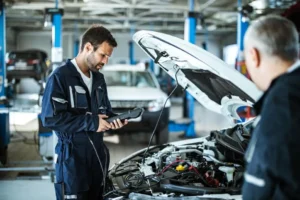
Every driver in the UK knows the stress of keeping their car in top condition. Between daily commutes, long trips, and the unpredictable weather, your vehicle takes quite a beating. That’s where two essential checks — the Full Service and the MOT — come in. Though people often mix them up, they serve different purposes, and both are equally important to keep your car safe, reliable, and legal on the road.
What Is an MOT?
An MOT (Ministry of Transport test) is a legal requirement for most vehicles over three years old. It’s designed to check that your car meets the minimum safety and environmental standards set by the UK government. Without a valid MOT certificate, your car isn’t road legal — and driving without one can land you fines or even invalidate your insurance.
During an MOT test, a certified mechanic will inspect key parts such as:
-
Brakes and suspension
-
Tyres and wheels
-
Lights, indicators, and mirrors
-
Seatbelts and airbags
-
Exhaust and emissions
-
Steering and general structure
If your car passes, you’re good for another year. If not, the garage will give you a list of faults and advise repairs before re-testing.
What Is a Full Service?
A Full Service goes beyond a legal check — it’s about keeping your car running smoothly. Think of it like a full health check-up rather than a quick doctor’s visit. It’s not compulsory, but it’s one of the smartest things you can do for your car’s long-term health.
A typical full service includes:
-
Oil and filter change
-
Brake checks and fluid top-ups
-
Engine inspection
-
Air and cabin filter replacement
-
Battery, spark plug, and coolant checks
-
Tyre pressure and tread checks
This kind of detailed inspection helps spot small issues before they turn into expensive problems later on.
MOT vs Full Service — The Main Difference
Here’s a simple way to remember it:
-
MOT = Safety and legal requirement
-
Full Service = Maintenance and performance
An MOT ensures your car meets the minimum standards to be on the road. A Full Service, on the other hand, makes sure your car stays reliable, efficient, and comfortable. One keeps you legal; the other keeps you moving without problems.
Why You Need Both
Some drivers assume that getting a Full Service means they can skip the MOT, or vice versa. But that’s not the case. Each plays a different role:
-
Stay Legal and Safe
The MOT ensures your car is roadworthy. Skipping it means risking fines or losing your insurance cover if something goes wrong. -
Save Money Long-Term
Regular servicing catches issues early. Replacing worn brake pads during a service costs much less than waiting for them to damage your discs. -
Better Performance and Fuel Economy
A well-serviced car runs smoother, uses less fuel, and produces fewer emissions. That’s good for your wallet and the planet. -
Higher Resale Value
When it’s time to sell, buyers always check the service history. A car with regular MOTs and Full Services gets better offers.
How Often Should You Get Them Done?
-
MOT: Every 12 months by law.
-
Full Service: Once a year or every 12,000 miles — whichever comes first.
If you drive a lot (for work or family trips), you might want an Interim Service every 6 months to keep things running smoothly.
Can You Combine MOT and Full Service?
Yes — and it’s often the best option. Many garages offer combined packages that include both at a discounted rate. This not only saves you money but also time, since both checks can be done in one visit.
Plus, mechanics can fix any minor issues spotted during the service before your MOT test, increasing your chances of passing the first time.
Choosing the Right Garage
When it comes to servicing and MOT, always pick a reputable, certified garage. Look for:
-
DVSA-approved MOT centre
-
Good online reviews
-
Clear pricing with no hidden fees
-
Qualified mechanics
Local garages often offer the best deals, but make sure they provide a proper service checklist before you agree to anything.
What Happens If You Skip Either?
Ignoring your MOT or Full Service can cause more trouble than it’s worth:
-
Your insurance may be invalid if you’re in an accident.
-
Small issues can grow into major repairs.
-
Your car might lose resale value.
-
You could get fined up to £1,000 for driving without an MOT.
Simply put, skipping these checks costs more in the long run — financially and legally.
Final Thoughts
Getting your Full Service and MOT done regularly is one of the smartest ways to protect your car and your wallet. The MOT keeps you compliant with the law, while the Full Service keeps your vehicle in top shape for everyday use.
Whether you drive a small hatchback for city commutes or a family SUV for longer trips, taking care of your car means safer journeys, lower costs, and peace of mind. Book both together, stay organised, and keep your car running like new — that’s the real key to worry-free driving in the UK.
